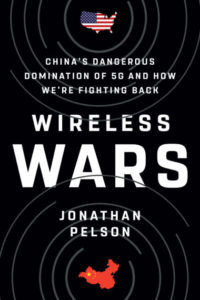Has China Won the Wireless Wars?
Adam Thierer and Jonathan Pelson discuss China’s domination of the telecom industry and its implications for U.S. national security
By Adam Thierer
This article is a slightly edited Q&A between Adam Thierer, a senior research fellow at the Mercatus Center at George Mason University, and Jonathan Pelson, a telecommunications expert and author of “Wireless Wars: China’s Dangerous Domination of 5G and How We’re Fighting Back.”
ADAM THIERER: In “Wireless Wars,” you document the rise and fall of the American mobile equipment sector, and you outline the strategies that Huawei and the Chinese Communist Party (CCP) utilized to take a commanding position in this arena. Your book is a terrific history that at times almost reads like a whodunit thriller, except in this case the question is: Who is responsible for losing competitive advantage in a major economic sector of strategic importance? What compelled you to investigate this topic, and how did your own experience in the cellular industry inform your perspective on this issue?
JONATHAN PELSON: The Western equipment companies who created the industry share responsibility for their own failure, of course. But if the telecom sector is considered important to national security—and it should be—then the government is at fault for not intervening. China offered cheap, effective research and manufacturing, and any company that didn’t move to China to take advantage of it would have gone broke trying to sell against the companies that did. But the Chinese makers were taking the technology through forced IP transfer and outright theft. And as long as governments allowed their carriers to buy Huawei and ZTE gear—subsidized by the Chinese Communist Party—they set up the process to turn over the equipment market to China.
I saw what had become of the once-mighty Bell Labs and Nortel and Motorola, and I wanted to tell the story about how we blew the lead and left the leadership in the hands of a geopolitical rival. I knew that my relationships with leaders in the industry would give me access to the key sources for the book, and they helped me tell a story that needed to be told.
THIERER: There has always been a national security angle to debates over communications networks and the policies that govern them. The CCP has strong motivations for boosting its own firms, not only for commercial reasons, but also to satisfy domestic and geopolitical objectives. Could you explain how they are doing so and what the ramifications of this could be in terms of their domestic and global surveillance efforts? More specifically, what have been some of the most important tactics used by Huawei and the CCP to gain leverage over other companies and nations in the mobile marketplace? Why have those tactics proven so successful?
PELSON: The CCP’s leaders recognized the power they could exert if they controlled the communications networks of companies and countries around the world. Not only could they spy, they could throttle or shut off communications. And they knew that carriers were ill-equipped to identify compromised equipment. China also used debt traps—loaning customers more than they could afford for equipment—to turn these carriers (many of them national carriers) into debtors that couldn’t push back against the Chinese holders of their debt.
The Chinese companies selling telecom gear benefit from a perfect combination of legitimate and improper advantages. Huawei is a well-run, aggressive company with a culture of winning at all costs. But that doesn’t explain how it grew so incredibly fast against really strong, entrenched competitors. It benefited from $75 billion in government subsidies (according to The Wall Street Journal) and extensive IP theft from competitors (according to numerous legal cases and law enforcement agencies). The subsidies let companies like Huawei win just by showing up: They would win contracts by low-bidding them, and if they lost, they still drove the winners down so low in price that they didn’t make the profit needed to reinvest in their own technology.
THIERER: How can multilateral efforts among major nations counter China’s techno-mercantilism? Can we handle some of these problems using international trade law and treaties? Or, with China operating outside international norms, are unilateral responses like we saw during the Trump years destined to become the norm, with retaliatory tariffs, trade wars and even arrests of private parties?
PELSON: This battle may be fought with trade law and treaties, or even tariffs and bans, but that doesn’t mean it’s an economic battle. We’ve been dealing with China as if it were a trading partner: pricing low, using aggressive tactics to win business. But my thesis in “Wireless Wars” is that Huawei is actually there to support China, not the other way around. It is helping the CCP export its brand of surveillance and suppression.
Free countries need to do whatever is necessary to remain independent of China’s suppliers for anything deemed strategic or important to national security. Some countries, especially developing countries, may not be able to resist the lure of cheap, turnkey systems from the world’s largest vendor, even if the medium- to long-term consequences are grave. The U.S. has a unique ability to apply meaningful pressure.
THIERER: Industrial policy is all the rage in the U.S. again, with bipartisan calls for massive new programs and spending initiatives, inspired at least in part by concerns over China. I’ve been critical of what I call the “casino economics” of industrial policy—with public officials repeatedly making bad bets using taxpayer dollars—and I worry about the government taking extreme steps to counter China. Some people are even calling for a nationalized 5G carrier. What are your thoughts on the various industrial policy proposals being floated for 5G and other high-tech sectors such as semiconductors?
PELSON: We do need an industrial and national policy, but not one that looks anything like what we’ve done before, and definitely not one that resembles China’s. The government destroys markets when it tries to pick winners—they end up backing the larger, politically connected incumbents and smothering new and better ideas in the crib. We need to limit government action to core, broadly applicable programs, such as creating and enforcing security standards and conducting research more at the physics level than the product level.
Even this has an element of steering investment, which isn’t ideal, but it can deliver funding at scale to the needed efforts without the government setting the direction of the development efforts. And the call for a federal 5G network had one thing right: It was a recognition of the gravity of the situation, when few seemed to see it, even if that particular solution wouldn’t have worked.
THIERER: In a recent Bloomberg column, Niall Ferguson suggested that, during the Cold War, many Western pundits and academics overestimated the economic might of the Soviet Union. He thinks “the same mistake is being repeated with the People’s Republic of China” today. I tend to agree with that and believe that while authoritarian societies can sometimes push through grandiose economic schemes in the short term, eventually the bill comes due and all the heavy-handed planning implodes on itself.
The Soviets got to space first and built some famously beautiful subway stations. But eventually their entire economic planning system collapsed under its own weight. To a lesser extent, that also happened with Japanese industrial policy in the 1990s, as I’ve documented here. A 2000 report by the Japanese Ministry of Finance concluded that the country’s long-standing industrial policy model “was not the source of Japanese competitiveness but the cause of our failure.” Chinese economic planning sits somewhere between those two models, but are they headed for a similar result?
PELSON: The Chinese advantage may be overblown; it’s hard for such a controlled system to achieve the robustness and efficiency created by truly open markets. But I wouldn’t compare them to the Soviets because China leverages more than just smart people directed by a focused government. They have, so far, let the investors get wealthy or go broke, sink or swim, at least to an extent, and this means they tap into a lot of what makes a capitalist society thrive.
I would compare China more to Japan, where the guiding hand of bureaucracy can help industry sectors but hamper leadership in the medium to long run. The economic danger to China is more stagnation than complete collapse like the Soviets. A greater risk to China than economic downturn may be political turmoil, which explains the urgency around stifling dissent. And given China’s scale versus Japan’s, and the enormous growth opportunities that remain to sell within its own borders to the lower and middle classes, China may have generations to go before it flatlines the way Japan has.
THIERER: While many in the U.S. rightly criticize the CCP’s heavy-handed approaches to economic planning and control of 5G and other technologies, ironically, America’s wireless marketplace has its own problems with top-down, technocratic regulation. Not only has the federal government long controlled spectrum allocation, but it has also micromanaged how wireless markets operate with its overbearing licensing and permitting procedures. Historically, this has impaired the efficient allocation and use of spectrum.
While spectrum auctions have made spectrum allocation a bit more efficient, regulators are still “zoning” spectrum in suboptimal ways. Put simply, the U.S. has rejected permissionless innovation for wireless and gone with a more precautionary approach. How does this play into the problems you identify in your book, and what can be done about it? Finally, are there other solutions that the U.S. government should be pursing?
PELSON: There’s no guarantee that the “free” countries, such as the U.S., will behave as such, whether we have Republicans or Democrats in charge. And there’s a lot more we could be doing to gain the advantage, including easing the hand of regulation, even in a space that requires government management of public assets such as airwaves. Spectrum auctions are an odd example: They use game theory to ensure the spectrum assets go to the bidder placing the highest value on them, which every free-market economist loves.
But that has the effect of stripping tens of billions of dollars from these companies just when we are urging them to invest in networks to give our country an advantage over others! They’re giving as much to the U.S. Treasury as they are putting into capital investment, or more! Any answer to this would be fraught with challenges—someone’s ox is being gored.
I would make a modest proposal. Run the auctions the way they are, but instead of taking the money from the bidders and dumping it into the Treasury, require the winners to spend that money on network build-out over a set period, say six years. So, if you “bid” $10 billion for spectrum, you win it but you have to “light up” your spectrum with $10 billion in physical investments or pay a fine and give it back to the government.
THIERER: Are there any other strategies or solutions that the U.S. and other countries should be pursuing to counter China? And are you optimistic that by working together on new technological solutions like these, America, Europe and others can counter the China challenge?
PELSON: China has beaten us so far by playing to its strengths—coordinated, targeted investing on a huge scale and a ruthless pursuit of intellectual property—and by playing to our weaknesses, mainly the disorganized, every-man-for-himself nature of open, competitive markets. I think we can beat China by unleashing the power that resides in our model and turn its own strengths into a burden that leaves it chasing the rest of the world.
Specifically, I think this means turning to what you’ve discussed as “permissionless innovation,” where barriers to entry in equipment markets are removed to invite a far wider range of participants. In telecom, this means opening the proprietary interfaces between elements in a 5G network so that any new player can introduce a solution, whether it’s a CalTech student writing network software apps or Dell creating a new radio or switch. This kind of freewheeling ecosystem plays much more into the culture of the U.S. and other free countries, and China has shown its unwillingness to tolerate disruptive behavior from its own entrepreneurs.
If CCP leaders would “disappear” Jack Ma for speaking out against excessive government meddling, what would they do to the next entrepreneur who tries to shake things up? America’s strength has always been the pushing of boundaries and breaking of rules. That can become our secret weapon to use against China.




